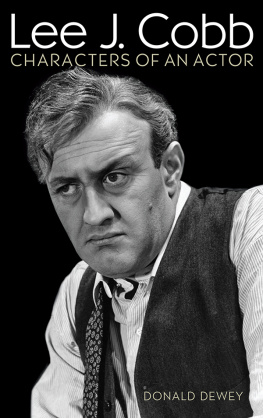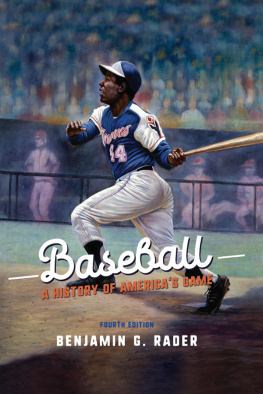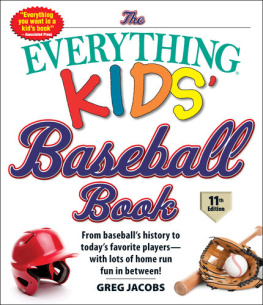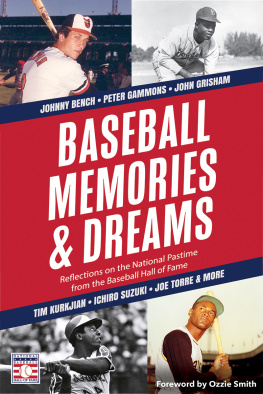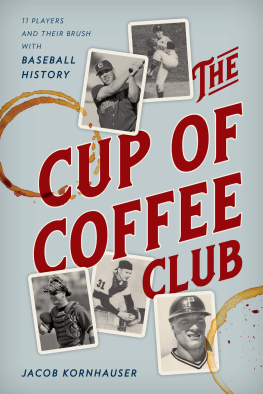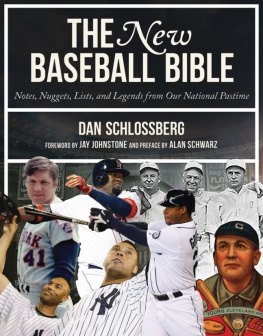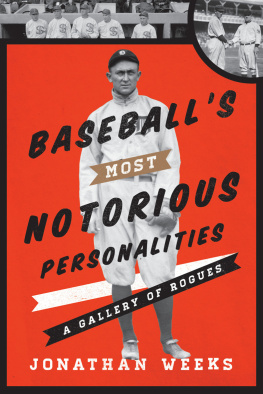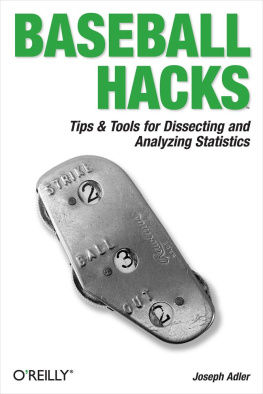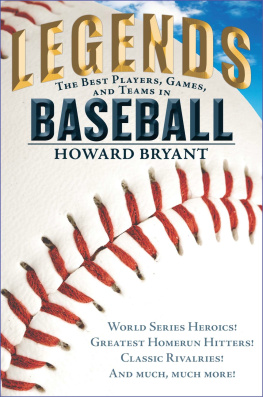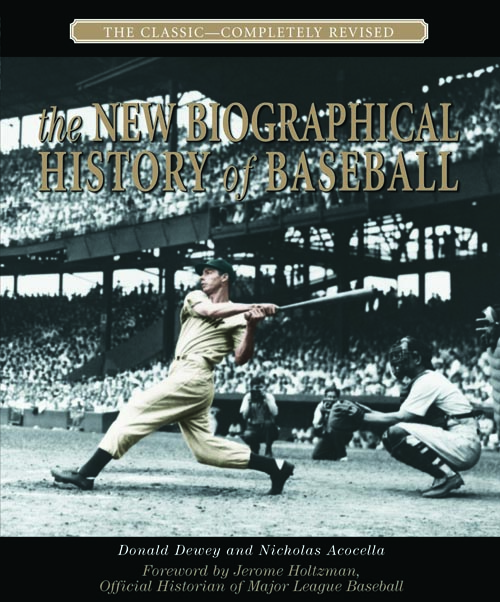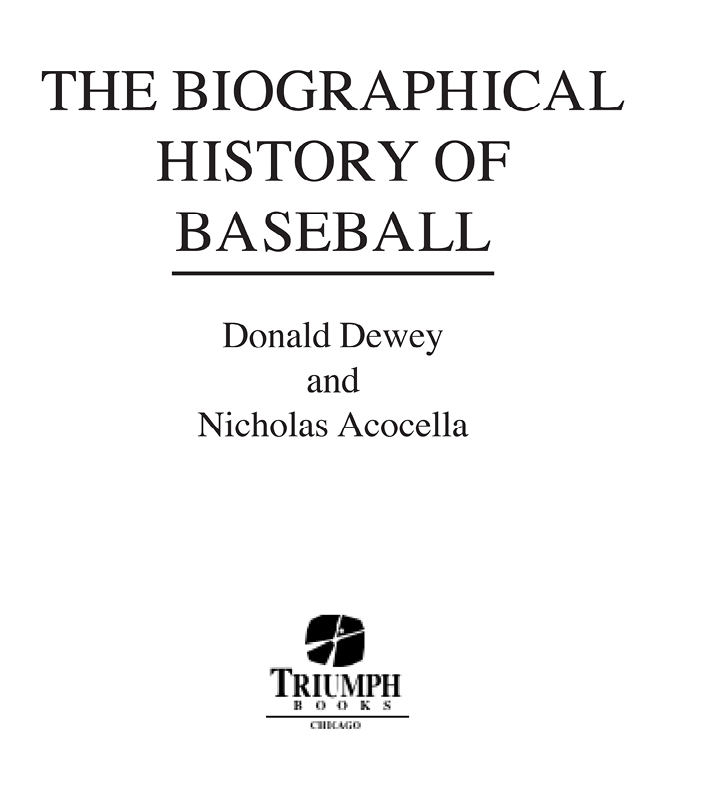
For George Shea and Caroline Acocella
Contents
Hank Aaron to Joe Azcue
Carlos Baerga to Tommy Byrne
Francisco Cabrera to Kiki Cuyler
Jay Dahl to Len Dykstra
Joseph Eastman to Buck Ewing
Red Faber to Carl Furillo
Eddie Gaedel to Tony Gwynn
Stan Hack to Cap Huston
Pete Incaviglia to Art Irwin
Bo Jackson to Billy Jurges
Jim Kaat to Bob Kuzava
Chet Laabs to Ted Lyons
Connie Mack to Jim Mutrie
Jim Nabors to Joe Nuxhall
Rebel Oakes to Danny Ozark
John Paciorek to Harry Pulliam
Tom Qualters to Jack Quinn
Charlie Radbourne to Nolan Ryan
Fred Saigh to Stuart Symington
William Howard Taft to Jim Tyng
Peter Ueberroth to George Uhle
Bobby Valentine to Chris Von Der Ahe
Rube Waddell to Early Wynn
Abe Yager to Robin Yount
Zip Zabel to George Zoeterman
Foreword by Jerome Holtzman
Official Historian for Major League Baseball
If you have been looking for a centerpiece for your baseball library, the search is over. This newly revised and extended edition of The Biographical History of Baseball is the answer. It is not the usual lengthy textbook treatment of how and where the game began, loaded with stats and standings, but a tapestry of biographical studies of the men and the few women who made significant contributions.
Better yet, instead of the usual chronological order beginning with the 1869 Cincinnati Reds, the biographies are an easier read and assembled in alphabetical orderfrom Hank Aaron to George Zoeterman, who has been lost in the fog of time. The White Sox signed Zoeterman in 1947 in violation of the spirit of the high school rule and were suspended from the American League for one week, until they paid the $500 fine.
Virtually all of the Hall of Fame players, managers, and executives are accounted for. One would expect brief and cursory biographies, run-of-the-mill stuff, but the authors had the wisdom to lengthen them according to their relative importance. Also, and this is crucial, their subjects are exposed as never before. You wont find any pap here.
Introduction
On June 12, 1939, a dual ceremony was held in Cooperstown, New York. The more conspicuous one celebrated the opening of the National Baseball Hall of Fame and Museum. The secondimplicit in the rstformalized major league baseballs move to enshrine itself as the national pastime and to charge an admission price for its past as well as its present.
In the six decades since that afternoon in Cooperstown, the history of baseball has lagged behind only the sport itself as a growth industry. Books, magazines, television documentaries, computer bulletin boards, newsletters, and academic treatises have charted the careers of all the Cincinnati milkmen who happened to drop by a ballpark and pitch a no-hitter in an 1882 exhibition game, while statistical research societies have furnished all the numbers necessary for demonstrating how many of those wunderkinder were really better than Cy Young (give or take 500 victories). The more expansive school of historians has produced mountains of evidence that major league baseball, while not always aware of it, had a revolutionary impact on racism, management-labor strife, the Nazi threat, and other evils plaguing American society as a whole. A third concentration of writings in recent years has identied baseball with the securities of the nuclear family and the sublimations of the detonated psychea force for the continuity of sons relating to fathers and potential rooftop snipers redirecting their furies at umpires. othat kind might be congratulatory.
It is not the intention of The Biographical History of Baseball to slap together another congratu- latory tour of baseballs names and numbers. Although one of this books assumptions is that the game has indeed served as a pastime for countless millions over 15 decades or more, and as such merits a cogent record of its development, The Biographical History does not accept that 19th-century trivia has become 20th-century signicance merely for being recalled or that the journeymen players of the 1920s have turned into venerable all-stars simply for no longer being forgotten. We are not interested in electing people to the Hall of Fame or even in reducing the number of those already on the premises. What we are interested in is singling out those who, on and off the diamond, have been most responsible for developing baseballprimarily in athletic and business ways, but also in its larger cultural impact as a mass entertainment and in its smaller personal imprint as an arena for the imaginative, traumatic, and even tragic. The individuals listed in The Biographical History have, in the view of the authors, done the most for consolidating the legitimacy, respect, and criticism that the Hall of Fame and other repositories of baseballs chronicles and legacies have attracted over the years.
The Biographical History is not a Whos Who. There has been no attempt to include every distinguished player and front-ofce executive in the annals of the game. The criterion for choosing entries has been one, and only one: for better or worse, has the subject inuenced the game, the popularity of the game, or the image of the game? Has baseball become richer or poorer as a sport, a business, or an entertainment because of his or her involvement in it? Did he or she leave a game that was different from the one entered?
The subjects covered by The Biographical History have been drawn mostly from the development of the National and American leagues. But since the history of the sport has hardly been exhausted by those two circuits, other entries owe their inclusion to their inuence on a protomajor league (the National Association), the three 19th-century leagues (the American Association, the Union Association, and the Players League) recognized as having been major, the one defunct 20th-century circuit (the Federal League) accorded the same status, the more begrudgingly acknowledged Negro leagues, the minor leagues, and some foreign circuits. The individuals cited within these areas fall into the followingand sometimes overlappinggroups.
Hall of Famers. Admittedly, election to Cooperstown has allowed several gures to slip under the rope of restrictions against capable but otherwise uninspiring contributors to the sport. This has been particularly obvious with regard to players (e.g., Ted Lyons and Herb Pennock) who owe their election to the one-time preponderance of big city sportswriters among voters and to ofcials who owe their enshrinement to the sports penchant for consecrating every aspect of the founding of the National League (e.g., Morgan Bulkeley) or its tendency to commemorate fealty over an extended period (e.g., Ford Frick). At the very least, however, the inclusion of all those who have received plaques at the Hall of Fame reects Major League Baseballs own estimation of its standards, priorities, and achievements. Beyond that, naturally, are the numerous players, ofcials, and others who have been indisputably seminal in their athletic or organizational accomplishments.
The Protagonists. Those who have been at the center of the games dening dramatic moments.
The Innovators. In everything from playing regulations and playing gear to administrative and broadcasting structures, changes in the sport have been the result of an individuals insight, resolve, or, in some instances, misfortune.
The Record Holders. More markedly than in other professional sports, baseball has always prized primacies, superiorities, and durabilities as part of its competitiveness. In some cases (e.g., Roger Maris and Hank Aaron), changes in the record holder have occasioned more than a bigger number as a standard.



